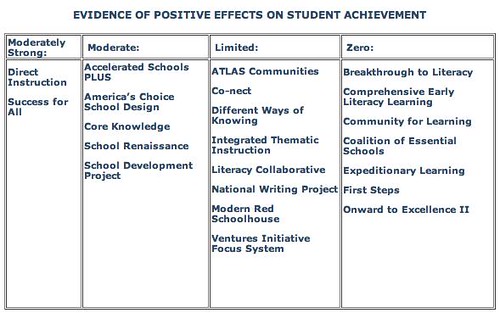....This is the seventh edition (2003) so [Robert Slavin] has been writing this for awhile. Here's a quote from the forward that really is a good example of why teachers are so confused:A couple of things.
"The field of educational psychology and the practice of education have changed a great deal in recent years, and I have tried to reflect those changes in this edition. Only a few years ago, direct instruction and related teacher effectiveness research were dominant in educational psychology. Then discovery learning, portfolio and performance assessments, and other humanistic strategies returned. Now, emphasis on "back to the basics" is returning, which requires teachers more than ever to plan outcomes and teach purposefully, qualities that I emphasize in this edition as intentional teaching. In the first and second editions of this text [1986 & 1988], I said that we shouldn't entirely discard discovery learning and humanistic methods despite the popularity, then of direct instruction. In the next editions, I made just the opposite pleas: that we shouldn't completely discard direct instruction [3rd edition: 1991] despite the popularity of active, student-centered teaching and constructivist methods of instruction. No matter what their philosophical orientations, experienced teachers know that they must be proficient in a wide range of methods and must use them with intentionality."
Good lord! I had no idea. Sounds a lot like the fashion world, doesn't it? By the way, his first and second editions were 1986 and 1988. The "next editions" were '91, '94, '97.
You know what a truly effective teacher is? A person who can wade through all of this gobbledy-gook and still be able to teach well. I think some teachers get so entrenched in one philosophy or another that they can't see whether there students are learning or not.*
First of all ---- dang.
We missed out on the direct instruction moment.
Second of all ---- dang again. Assuming a back to basics movement is actually occurring inside ed schools, hard to imagine given what we're hearing from Barry, my district isn't going to catch up to it until Christopher has graduated.
Robert Slavin, btw, is the creator of Success for All, one of two school-wide programs (the other being Engelmann's Direct Instruction) with moderately strong evidence of success according to a study from the now-defunct Comprehensive School Reform Center.

source:
Not all reforms are created equal
American Educator
March/April 2006
full-color chart available as pdf file
_____________
*N. wrote this post for Linda Moran's beyond TERC.





5 comments:
Here's a quote from the forward [sic] that really is a good example of why teachers are so confused:
I think some teachers get so entrenched in one philosophy or another that they can't see whether there [sic] students are learning or not.
Am I just being hopelessly old-fashioned, or should teachers and prospective teachers really pay some attention to spelling?
what???
That's a quote from the foreword of Slavin's textbook???
oh brother
No.
The mistakes were made by the prospective teacher you quoted.
The textbook we're using in my ed psych class is all over the map as well. They play both sides of the fence, much as the Beatles did in 1968 with "Revolution". After singing that if revolution was about destroying things and wreaking havoc they said "You can count me out", after a few chords of music, they suddenly chimed the word "In!". You gotta please the demographics if you want to sell records. Well, it WAS 1968 and it WAS the best of times and the worst of times.
And so it is with textbooks and edu-philosophy. My book "Eduational Psychology" by Ormrod, talks about the need to practice to get things down to automaticity, then in another section talks about the senselessness of drilling. You tell me what's going on.
Post a Comment